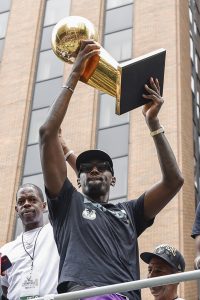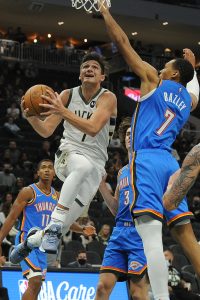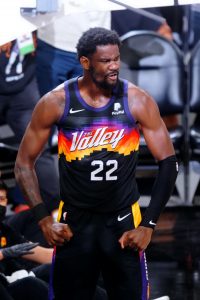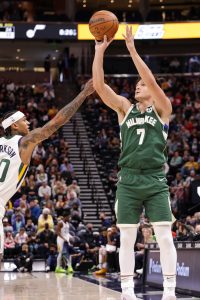Hoops Rumors is breaking down the 2021 offseason for all 30 NBA teams, revisiting the summer’s free agent signings, trades, draft picks, departures, and more. We’ll evaluate each team’s offseason moves and look ahead to what the 2021/22 season holds for all 30 franchises. Today, we’re focusing on the Milwaukee Bucks.
Free agent signings:
 Note: Exhibit 9 and 10 deals aren’t included here.
Note: Exhibit 9 and 10 deals aren’t included here.
- Bobby Portis: Two years, $8.91MM. Second-year player option. Re-signed using Non-Bird rights.
- George Hill: Two years, $8MM. Signed using taxpayer mid-level exception.
- Thanasis Antetokounmpo: Two years, minimum salary. Second-year player option. Re-signed using minimum salary exception.
- Rodney Hood: One year, minimum salary. Signed using minimum salary exception.
- Semi Ojeleye: One year, minimum salary. Signed using minimum salary exception.
- Justin Robinson: Two-way contract.
Trades:
- Acquired the draft rights to Sandro Mamukelashvili (No. 54 pick), the draft rights to Georgios Kalaitzakis (No. 60 pick), either the Pacers’, Cavaliers, or Jazz’s 2024 second-round pick (whichever is most favorable), and either the Pacers’ or the Heat’s 2026 second-round pick (whichever is most favorable) from the Pacers in exchange for the draft rights to Isaiah Todd (No. 31 pick).
- Note: If the Cavaliers’ and Jazz’s 2024 second-round picks are the two most favorable of the three, the Bucks would acquire the least favorable of those two picks.
- Acquired Grayson Allen and cash ($1MM) from the Grizzlies in exchange for Sam Merrill, either the Pacers’, Cavaliers, or Jazz’s 2024 second-round pick (whichever is most favorable), and either the Pacers’ or the Heat’s 2026 second-round pick (whichever is most favorable).
- Note: If the Cavaliers’ and Jazz’s 2024 second-round picks are the two most favorable of the three, the Grizzlies would acquire the least favorable of those two picks.
Draft picks:
- 2-54: Sandro Mamukelashvili
- Signed to two-year, two-way contract.
- 2-60: Georgios Kalaitzakis
- Signed to three-year, minimum-salary contract. First year partially guaranteed. Second and third years non-guaranteed. Signed using taxpayer mid-level exception.
Contract extensions:
- Grayson Allen: Two years, $17,000,000 (base value). Includes $2.55MM in incentives. Starts in 2022/23.
Departing players:
Other offseason news:
- Signed head coach Mike Budenholzer to three-year contract extension.
- Signed general manager Jon Horst to a long-term contract extension.
Salary cap situation:
- Remained over the cap and above the tax line.
- Carrying approximately $155.5MM in salary.
- $964,742 of taxpayer mid-level exception still available ($4,925,258 used on George Hill and Georgios Kalaitzakis).
- Three traded player exceptions available, including one worth $1.62MM.
The Bucks’ offseason:
Following a half-century climb to return to the NBA mountaintop, the Bucks have a new – and just as difficult – challenge: How do they stay on top? For the most part, Milwaukee chose to stick with a winning formula.
 The Bucks have the same starting five, including the Big Three of Giannis Antetokounmpo, Khris Middleton and Jrue Holiday. They also re-signed key frontcourt reserve and fan favorite Bobby Portis to a team-friendly two-year deal.
The Bucks have the same starting five, including the Big Three of Giannis Antetokounmpo, Khris Middleton and Jrue Holiday. They also re-signed key frontcourt reserve and fan favorite Bobby Portis to a team-friendly two-year deal.
The biggest offseason acquisition, Grizzlies swingman Grayson Allen, was something of a surprise. The Bucks didn’t have to give up much to acquire Allen, who started 38 of 50 regular-season games for Memphis last season. He’ll give the team another perimeter threat (38.0% on 3-point attempts) and a dependable free throw shooter (83.2%). He essentially replaces Bryn Forbes, who knocked down 45.2% of his 3-point tries during his lone season in Milwaukee.
The Bucks thought enough of Allen to hand him a tw0-year extension that can be worth up to $19.55MM. That deal, finalized right before the October 18 deadline, gave the Bucks some coverage in case they don’t re-sign Donte DiVincenzo as a restricted free agent next summer.
Milwaukee didn’t show much interest in re-signing 36-year-old P.J. Tucker, even though Tucker averaged 29.6 MPG during the championship run. The Bucks instead chose to add Semi Ojeleye, who’s 10 years younger than Tucker. Ojeleye was a rotation player with Boston for the last four seasons, and while he won’t contribute much offensively, he’s a versatile defender.
George Hill is back for a second stint with the organization. The 35-year-old Hill will back up Holiday after the Bucks chose not to re-sign Jeff Teague. The club also took a flyer on swingman Rodney Hood, a 36.7% 3-point shooter whose career has been sidetracked by injuries, most notably an Achilles tear in December 2019.
GM Jon Horst and head coach Mike Budenholzer were rewarded with long-term extensions for a job well done.
The Bucks’ season:
The Bucks caught some breaks during their postseason run and had the talent and toughness to take advantage of their good fortune.
If Kevin Durant hadn’t stepped on the 3-point line in Game 7 at the end of regulation, the Bucks would have gone home after the conference semifinals and Budenholzer would probably have been seeking other employment. Milwaukee also got favorable matchups in the final two rounds, downing a pair of upstart contenders without significant playoff experience – the Hawks and Suns – in the Eastern Finals and NBA Finals.
There’s no reason for Milwaukee to be anything but a major contender to win it all again. The team has a two-time MVP in the prime of his career flanked by two All-Star caliber veterans. The chemistry of the first unit is undeniable and the Bucks’ continuity will make it nearly impossible to rattle them when they enter the postseason this spring.
Still, there are some questions, namely whether the second unit has enough answers to keep the starters from getting gassed by the end of the 82-game grind. As a taxpaying team, the Bucks don’t have a lot of leeway to make in-season adjustments. They may need to explore the buyout market after the trade deadline to fortify the bench.
Provided they stay generally healthy, the Bucks will provide their fans with plenty more thrills this season, and perhaps another long and rewarding journey to the Finals.
Salary information from Basketball Insiders and Spotrac was used in the creation of this post. Luke Adams contributed to this post.
 Note: Exhibit 9 and 10 deals aren’t included here.
Note: Exhibit 9 and 10 deals aren’t included here. The Bucks have the same starting five, including the Big Three of
The Bucks have the same starting five, including the Big Three of  For example, Suns center
For example, Suns center  4:16pm: The Bucks have reached an agreement on a two-year, $20MM rookie scale contract extension with wing
4:16pm: The Bucks have reached an agreement on a two-year, $20MM rookie scale contract extension with wing